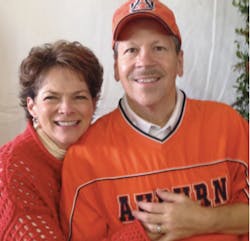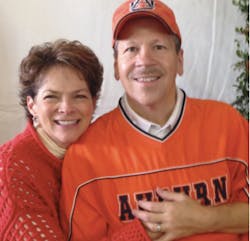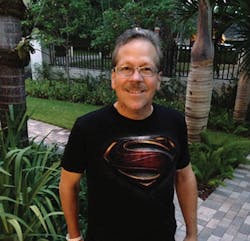Living On
An interview with a multi-organ transplant recipient
BY Karen Davis, RDH, BSDH
Within the world of organ transplantation, a few surgeons have become masters. Some have the ability to remove not one or two but multiple diseased organs and transplant healthy donor organs, resulting in an amazing new lease on life. My husband, David Sandlin, was the recipient of a multivisceral organ transplant (MVOT) on August 7, 2013.
I interviewed David with the intent to provide information related to organ transplantation, understand some dental implications related to transplantation, and offer hope to our patients awaiting transplantation.
Karen: David, what circumstances led you to need transplantation of your liver, stomach, pancreas, and intestines?
David: On July 16, 2008, I was diagnosed with a rare form of pancreatic cancer called islet cell neuroendocrine cancer, and it had metastasized to my liver. This is a slower-growing version of cancer than most aggressive pancreatic cancers, but my liver was inoperable due to "too many to count" tumors scattered throughout the liver tissue.
Interestingly, this is the same version of cancer Steve Jobs of Apple Computers died from in 2011. The primary tumor in the tail of my pancreas was surgically removed in 2008, and then in 2009 and again in 2011 I underwent targeted radioactive therapy to the liver that was delivered through microscopic beads injected via the portal vein.
By July 2012 scans revealed that tumors on the tail of the pancreas had recurred and liver tumors were growing again. My oncologist, who is an expert in treating various versions of neuroendocrine cancer, recommended I be evaluated for a multivisceral organ transplant to remove cancerous, diseased organs and "start over" with cancer-free organs.
That sounded completely radical to me and I thought I must be dying, but I learned that, in order to be a good candidate for this procedure, you couldn't wait until your own organs were completely failing, or you were too sick to undergo the surgery.
Karen: Are you aware of other indications for such radical types of transplants?
David: When I was on the transplant floor during recovery, nurses told me that one of the most common reasons for MVOT was for patients facing organ failure as a result of previous gastric bypass surgeries. That was surprising to me. I'm also aware of multi-organ transplants for infants that are born without properly functioning abdominal organs and for some individuals that have undergone massive injury to abdominal organs.
Karen: What kinds of tests did you have to undergo to determine if you were even a candidate for a multi-organ transplant and how long did that take?
David: First of all, I had to have a dental clearance that confirmed I had no evidence of chronic infection in my mouth. I had various types of scans, ultrasounds, and X-rays to every part of my body to ensure the cancer was localized within the abdominal cavity. Had it spread to the bones or lungs or other organs, I would not have been a candidate.
In addition, I had about 40 vials of blood taken to run exhaustive tests to look for everything from histocompatibility to viral infections. Tests on my heart revealed moderate blockage in one artery. Under normal circumstances, it would have warranted "observation" but since the risk of dying from a heart attack during multi-organ transplants is greater than dying from the transplant itself, the cardiologist wanted to take no chances. I had to have two stents placed in my artery, which meant I had to be on a blood thinner for six months, during which time I could not be considered for transplants.
At the completion of six months, fortunately I was able to discontinue blood thinners, and additional tests revealed I was a good candidate for transplantation. Timing for all of this was interesting. It took about four months for insurance to even approve the testing and to get all tests scheduled. That, coupled with the six months post-stent placement meant it was almost one year from the time that I learned about this option to the time that I was placed on the list for transplants.
Karen: Where did you have your multi-organ transplant performed?
David: I went to the Miami Transplant Institute where Dr. Rodrigo Vianna leads the abdominal transplant team. He has performed over 200 multi-organ transplants and I was the fifteenth patient specifically with neuroendocrine cancer to have this procedure. I had to relocate to Miami after rigorous testing and insurance approval in order to be nearby once donor organs were available.
Because I had begun to experience weight loss and the cancer markers were very elevated, I was high on the waiting list once I arrived. I only waited one month before I received a call that donor organs were available and were a good match for me. All organs came from one donor, and tragically, he was only 20 years old, but it was life giving for me.
My surgeon said I was very close to organ failure due to the collateral damage to my liver, stomach, and small intestine from the previous targeted radioactive therapy. That damage never showed up on any scan, but could be readily seen when the surgeon opened me up. I would not have survived any other treatment. Multi-organ transplantation saved my life. I now have a new liver, stomach, pancreas and intestines that are cancer-free. I have such gratitude for those that pursue the difficult specialty of organ transplantation.
Karen: Can you describe the recovery process from a multi-organ transplant?
David: Well, thankfully they told me I was the new "poster child" for multi-organ transplants as I had a very successful outcome. The surgery took 10 hours but I was only in intensive care for three days instead of the typical week following this type of surgery. I was able to walk out of the hospital exactly two weeks after I went in. Often, the hospital stay is for several weeks for this procedure.
It was very painful initially, but I knew it would be temporary. So I focused more on that during my recovery than the pain. I had regular bloodwork and biopsies, and they altered my medications to help achieve the right balance for the next four months while I recovered in Miami. I had to be willing to relocate not only for the surgery but also for however long the recovery took.
In early January, I was released to return to Texas, which was five months after my transplant. The surgeon informed me I would get down to my "dry" weight following surgery, which for me was almost 30 pounds different from my weight prior to surgery. Gradually, I have begun to regain weight and muscle mass.
One of the biggest changes for me has been diet related. It often takes many months for the new stomach and intestines to completely adapt, and I have had to modify my intake to include much smaller meals several times a day and avoid things such as sugar and dairy that tend to increase diarrhea. I actually have a great quality of life and am able to work, golf, exercise, and enjoy friends and family. I am so thankful God enabled me to have this life-saving procedure.
Karen: Have you had any reactions to the anti-rejection medications and how have you managed that?
David: Yes, I have had some reactions to medications. Immediately following the surgery, they started me on a very common anti-rejection medication called Prograf. After about one month, they introduced a second anti-rejection medication called everolimus, also known as Afinitor. That medication is also used as a chemo treatment for neuroendocrine cancer but it doubles as an anti-rejection medication.
Having known of other neuroendocrine patients who take everolimus, I was aware that a common side effect initially is the development of numerous mouth ulcerations and mucositis. I experienced that, and it was so severe that it impacted my ability to eat at a crucial time when I needed calories for continued recovery. I found several things that helped alleviate pain and helped the mouth sores heal. I used a prescription mouth rinse formulated by a pharmacist called "magic mouthwash," which is a mixture of lidocaine, antihistamine, and Maalox.
I also applied PerioSciences antioxidant gel numerous times per day on my ulcerated gum tissue for relief. A product I learned about from other neuroendocrine patients is a prescription called triamcinolone cream, which also relieved discomfort. Maintaining good oral hygiene is important due to immunosupression, and even though my mouth was very sore at that time, I was able to use my Sonicare brush on the "sensitive" setting. The mucositis and ulcers resolved after about two weeks but I was thankful to have numerous treatments to help manage the pain.
Karen: What modifications have you had to make as a multi-organ transplant recipient?
David: Obviously, I wear a protective mask on airplanes and in public places where a lot of people are gathered in small spaces.
I intentionally avoid being around anyone known to be sick. I carry hand sanitizer wherever I go and wash my hands frequently. I have learned to make healthier food choices and have to avoid raw fish as in sushi. Due to bacteria and staph present in the soil I now have to wear gloves for yard work. I am told I cannot ride a horse, but I didn't do that before the transplants, so that is OK. I can't do abdominal crunches, but who wants to do those anyway?
Karen: David, thankfully you have been given a new lease on life as a result of your transplantation. What message would you like to pass on to those reading this today?
David: Number one, be an organ donor. It saves lives! I know not everyone will have cancer, but everyone will have struggles in life. I have tried to apply a saying my brother-in-law passed on to me: "I will hope in God when I have no hope for optimism." When you come close to facing death, every day takes on new meaning and you understand what a gift life really is. I am more grateful than I can express.
Walking this journey with David afforded me an opportunity to learn about management of chronic diseases up close and personal. I'd like to share a few insights that could be helpful should you or a loved one find yourself coping with a serious illness.
1. Learn slightly more than your doctors know about your condition! Obviously, this is tongue-in-cheek, but you get the idea. Once you are faced with a life-threatening diagnosis, you must become a student. You must learn quickly, and you need to continually formulate questions to discuss with experts in order to understand risks vs. benefits of various treatments. Being well informed actually helps you determine when a recommendation doesn't fit within the standard of care or most current treatment protocols for your condition. You and your loved ones must become your own advocates.
2. Get more than one expert opinion! Get two or even three opinions from those considered experts in managing your condition. For David's original diagnosis of neuroendocrine cancer, we sought three expert opinions before deciding upon surgery. For his transplant, we sought three opinions to be certain this was the best treatment and to be certain whom to use for the procedure. Even if all the opinions are different (as ours were in both cases), you will learn valuable insights by consulting with those most knowledgeable about your condition, which will enable you to make tough decisions.
3. Learn from those who have walked in your shoes! Perhaps the best place to learn what you really need to know is from other patients with your diagnosis. We immediately joined a support group for neuroendocrine cancer and continue to learn from brave individuals walking one step ahead of us.
4. Go with what you know! These five words can be life giving when traveling a long road that presents many twists. The minute the brain hears cancer or lupus or any other type of serious diagnosis, the temptation to leap ahead into the "what ifs" is almost overwhelming. Most of the time the possibilities are not probabilities. You need to reserve energy for handling the realities as they present themselves rather than the energy drain that goes with dwelling on potential problems.
None of us facing serious health issues would wish that on anyone we love; however, abundant life is possible even with such a diagnosis. David Sandlin is a story of hope. I am humbled by his strength and his attitude and remain grateful to walk this journey by his side.
KAREN DAVIS, RDH, BSDH, is the founder of Cutting Edge Concepts, an international continuing education company, and practices dental hygiene in Dallas, Texas. She is an independent consultant to the Philips Corp., Periosciences, Inc., and Interleukin Genetics. She can be reached at [email protected].


